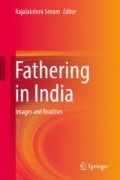Abstract
The tribal children of Odisha live in remote villages and are often first-generation learners or speak mother tongues that have no written script. Often, these children lack access to basic quality education. To address this situation, both government and non-government organisations in Odisha are providing a variety of educational interventions. These often engage parents and the local community, which has resulted in a positive and gradual shift in attitudes among tribals, towards education of their children. The findings in this paper are drawn from a longitudinal study that involved 77 interviews and demographic surveys with fathers and 30 focus group discussions with community members. The data shed light on the reasons for selecting their child’s preschool centre and their views on child attendance, child’s abilities, centre workers and activities, language usage and MLE (multilingual education). Early childhood education programmes encouraged tribal fathers to participate in classroom activities and school governance, develop teaching and learning materials and build/fix the school infrastructure. In the absence of prior empirical evidence, findings from this study can inform father and family engagement programme and policies and support the need for two-generation programmes for disadvantaged populations.
The authors wish to express appreciation for the funding provided by Bernard van Leer Foundation (BvLF) for the Odisha Impact study
Access this chapter
Tax calculation will be finalised at checkout
Purchases are for personal use only
Notes
- 1.
Though we observed higher p values, i.e. >0.05, for the correlation between father’s non-involvement and children’s performance, there seems to be a trend that shows negative correlation. These results may be significant for a large number of observations.
References
Behera, M. (2014). Status and problems of educational scenario of particularly vulnerable tribal groups in Odisha: Government initiatives. Journal of Economics & Social Development, X(1), 131–143 ISSN:0973-886X.
Bhattacharjea, S., Wadhwa, W., & Banerji, R. (2011). Inside primary schools: A study of teaching and learning in rural India. Assessment Survey Evaluation Research: Pratham Mumbai Education Initiative.
Census. (2011). Odisha: Executive summary. Office of Registrar General & Census Commissioner, Ministry of Home Affairs, Government of India. Retrieved from http://www.censusindia.gov.in/2011census/PCA/PCA_Highlights/pca_highlights_file/Odisha/Executive_Summary.pdf. Accessed 11 Jan 2017.
Department for Children, Schools and Families (DCSF). (2009). The impact of parental involvement on children’s education. London: DCSF Publications. ISBN:978-1-84775-252-9. Retrieved from https://www.ucy.ac.cy/nursery/documents/ThemaVdomadas/DCSF-Parental_Involvement_1.pdf. Accessed on 29 May 2017.
Garnaik, I., & Barik, N. (2012). Role of Ashram School in tribal education: A study of a block in Jharsuguda district, Odisha review. Retrieved from http://odisha.gov.in/e-magazine/Orissareview/2012/oct/engpdf/85-89.pdf. Accessed 31 Mar 2017.
Government of Odisha. (2014). Odisha economic survey, 2013–2014. Planning and Coordination Department, Directorate of Economics & Statistics, Government of Odisha. Retrieved from http://www.odisha.gov.in/pc/Download/Economic_Survey_2013-14.pdf. Accessed 2 Feb 2017.
Gupta, V., Rajesh, A., Pai-Samant, S., Chaudhary, N., & Gupta, P. (2016). Case studies of people’s rural education movement (PREM) centers and children: The Odisha impact assessment study (2011–2016). The Hague: Bernard van Leer Foundation.
Mohanty, A. K. (2008). Perpetuating inequality: Language disadvantage and capability deprivation of tribal mother tongue speakers in India. In W. Harbert (Ed.), Language and poverty (pp. 102–124). Clevedon/Avon: Multilingual Matters.
Mosle, A., Patel, N., & Stedron, J. (2014). Top ten for 2Gen: Policy ideas & principles to advance two-generational efforts. Washington, DC: ASCEND The SPEN Institute.
NITI Aayog. (2017). Gross enrolment ratio: Primary level. Retrieved from http://niti.gov.in/content/gross-enrolment-ratio-primary-level. Accessed 16 Mar 2017.
PREM. (2014). Annual report 2013–2014. Accessed on 18 July 2017.
Samal, R. (2012). Parents’ attitude towards schooling and education of children. Master degree thesis. Department of Humanities and Social Sciences, National Institute of Technology, Rourkela. Retrieved from http://ethesis.nitrkl.ac.in/3233/1/Final.pdf. Accessed 10 Feb 2017.
Author information
Authors and Affiliations
Corresponding author
Editor information
Editors and Affiliations
Rights and permissions
Copyright information
© 2019 Springer Nature Singapore Pte Ltd.
About this chapter
Cite this chapter
Gupta, V., Rajesh, A., Pai-Samant, S., Gupta, P. (2019). Fathers and Child Education in Tribal Odisha: Reflections of Commitment Amidst Constraints. In: Sriram, R. (eds) Fathering in India. Springer, Singapore. https://doi.org/10.1007/978-981-13-1715-6_16
Download citation
DOI: https://doi.org/10.1007/978-981-13-1715-6_16
Published:
Publisher Name: Springer, Singapore
Print ISBN: 978-981-13-1714-9
Online ISBN: 978-981-13-1715-6
eBook Packages: Social SciencesSocial Sciences (R0)

